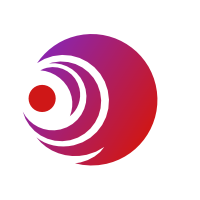
PoetryVerse

Shel Silverstein
The homework machine.
The Homework Machine, Oh, the Homework Machine, Most perfect contraption that's ever been seen. Just put in your homework, then drop in a dime, Snap on the switch, and in ten seconds' time, Your homework comes out, quick and clean as can be. Here it is— 'nine plus four?' and the answer is 'three.' Three? Oh me . . . I guess it's not as perfect As I thought it would be.

Feel free to be first to leave comment.

Shel Silverstein
The homework machine.
#AmericanWriters
Other works by Shel Silverstein...
Policeman, policeman, Help me please. Someone went and stole my knees. I’d chase him down but I suspect My feet and legs just won’t connec…
I knew that she belonged to someon… But lonesome-lookin’ women are a w… And so I bought that stuff about… And I figured I would love her so… But just when I got up to leave,…
I tripped on my shoelace And I fell up— Up to the roof tops, Up over the town, Up past the tree tops,
Sarah Cynthia Sylvia Stout Would not take the garbage out! She’d scour the pots and scrape th… Candy the yams and spice the hams, And though her daddy would scream…
If you want to marry me, here’s wh… You must learn how to make a perfe… And you must sew my holey socks, And soothe my troubled mind, And develop the knack for scratchi…
She was dancin’ when I seen her,… In a neighborhood they call 'La Z… She had a child’s smile, but she t… It would take a lot of gold to get… Acapulco Goldie, donde did you go…
Dave McGunn was a surfin’ bum, ha… From Waikiki to the Bering Sea,… Now he hung offshore ’bout a mile… And his wild eyes gleamed as he sc… To ride the perfect wave.
Thanksgiving dinner’s sad and than… Christmas dinner’s dark and blue When you stop and try to see it From the turkey’s point of view. Sunday dinner isn’t sunny
Now, listen to me, folks... Hear what I say. You got to eat oysters everyday They’ll put your love life back on… They’re nature’s own aphrodisiac.
I met her on a corner in Duluth (That’s the truth.) She was tryin’ to fix her shoe i… (Her name was Ruth.) She said she was just waiting for…
Well now I once knew a woman list… And the first time I seen her I k… Well now she swore she’d love me a… God damn but I don’t even remembe… Well now I once knew a woman and…
My beard grows down to my toes, I never wears no clothes, I wraps my hair Around my bare, And down the road I goes.
Peg plugged in her ‘lectric toothb… Mitch plugged in his steel guitar, Rick plugged in his CD player, Liz plugged in her VCR. Mom plugged in her ‘lectric blanke…
Once there was a tree.... and she loved a little boy. And everyday the boy would come and he would gather her leaves and make them into crowns
I have nothing to put in my stew,… Not a bone or a bean or a black-ey… So I’ll just climb in the pot to… If I can make a stew out of me. I’ll put in some pepper and salt a…

The Homework Machine- Summary & Analysis
Table of Contents
About the Poem “The Homework Machine”
Themes of the homework machine .
The themes of the poem “The Homework Machine” by Shel Silverstein are:
- The dangers of relying on technology ➤ The poem suggests that if we rely too much on technology to do our work for us, we may lose the ability to think for ourselves and learn.
- The importance of hard work ➤ The poem also suggests that there is no substitute for hard work. Even if we had a machine to do our homework for us, we would not really be learning anything.
- The importance of creativity and imagination ➤ The poem ends with the speaker imagining a world where everyone is the same and no one is creative. This suggests that creativity and imagination are essential for a fulfilling life.
“ The Homework Machine ” Poem by Shel Silverstein
The Homework Machine, Oh, the Homework Machine, Most perfect contraption that’s ever been seen. Just put in your homework, then drop in a dime, Snap on the switch, and in ten seconds’ time, Your homework comes out, quick and clean as can be. Here it is- ‘nine plus four?’ and the answer is ‘three.’ Three? Oh me . . . I guess it’s not as perfect As I thought it would be.
The Homework Machine Summary & Analysis
The Homework Machine by Shel Silverstein is a humorous and cautionary poem about the dangers of relying on machines to do your work for you.
The poem begins with the speaker describing the “Homework Machine” as the “most perfect contraption that’s ever been seen.” The speaker is excited about the machine because it can do your homework for you. All you have to do is put in your homework, drop in a dime, and snap on the switch. In ten seconds, your homework will be done, “quick and clean as can be.”
The speaker is eager to try out the machine, so they put in their math homework and drop in a dime. They snap on the switch, and in ten seconds, their homework is done. The speaker is thrilled. They can now spend their time doing other things, like playing or watching TV.
However, the speaker’s excitement is short-lived. When they look at their homework, they realize that the machine has given them the wrong answer to a math problem. The answer to “nine plus four” is three, which is obviously incorrect.
The speaker is disappointed and frustrated. They realize that the Homework Machine is not as perfect as they thought it was. They also realize that they need to learn to do their own homework, even if it is difficult.
The poem ends with the speaker realizing that they “guess it’s not as perfect / As I thought it would be.” This line is a reminder that we should not rely on machines to do everything for us. We need to learn how to think for ourselves and do things on our own.
FAQs from The Homework Machine
What is the story of the homework machine.
A kid finds a homework machine, but it gives them the wrong answer to a math problem, so they learn that it’s important to do their own work.
What is the central idea of the poem homework?
The central idea of the poem “The Homework Machine” is that it is important to learn to do your own work, even if it is difficult.
Other Free Summaries:

Leave a Comment Cancel reply
Save my name, email, and website in this browser for the next time I comment.

- POET'S PAGE
Shel Silverstein
The homework machine, see more of poemist by logging in.
Login required!
- The Homework Machine
- Shel Silverstein
Reading Time: < 1 minute
The Homework Machine, Oh, the Homework Machine, Most perfect contraption that’s ever been seen. Just put in your homework, then drop in a dime, Snap on the switch, and in ten seconds’ time, Your homework comes out, quick and clean as can be. Here it is— ‘nine plus four?’ and the answer is ‘three.’ Three? Oh me . . . I guess it’s not as perfect As I thought it would be.


The Homework Machine
By shel silverstein.
The Homework Machine, Oh, the Homework Machine, Most perfect contraption that’s ever been seen. Just put in your homework, then drop in a dime, Snap on the switch, and in ten seconds’ time, Your homework comes out, quick and clean as can be. Here it is— ‘nine plus four?’ and the answer is ‘three.’ Three? Oh me . . . I guess it’s not as perfect As I thought it would be.
This Poem Features In:
- poems about homework

Related Posts:
- Paranoid By Shel Silverstein
- Wavy By Shel Silverstein
- Where The Sidewalk Ends By Shel Silverstein
- Hug 'O War By Shel Silverstein
- Pour Me Another Tequila Sheila By Shel Silverstein
- Sick By Shel Silverstein
- April 12, 2022
Pick Me Up Poetry
Trending articles, the ultimate guide to 2024’s most prestigious poetry awards, 57+ websites that will pay for your poetry in 2024, the history of poetry (5000bc- 2024) – a timeline, the top 25 instagram poetry accounts, trending poems, a christmas poem by helen steiner rice, she is gone by david harkins, introspection by nikki giovanni, the joy of giving by john greenleaf whittier, trending collections, 13+ glorious poems about unity: strength in numbers, 5+ powerful poems about emotional abuse: the power of words, 17+ authentic poems about community: growing together, 17+ interesting poems about listening: being present, 7+ exciting poems about gifts and presents: wrapped in love, 11+ unique poems about moving houses: bittersweet goodbyes.

Specializing in Birth, Life, Love. Documenting Your Story
Shel silverstein’s ‘homework machine’.
My Homework Machine, Ode to Shel Silverstein – July, 2015-May 2016
This is a photograph emulating a poem by Shel Silverstein’s, ‘Homework Machine’. I created this for my kids, avid fans of Mr. Silverstein. It took a year to get it all together, but it was worth it to give them this memory of how once when they were little, they were part of one of their favorite author’s creations.
We are fond of our books. Some books hold a special place in our hearts as we remember reading them as children, and others are newer books we joyously devour. Bedtime at our house consists of a ritualistic reading from our ever growing list of favorites. How about you and your crop of little people? Did you ever think of how much fun it would be to literally (pun intended) jump into one of your favorite books, or for your children to jump into one of theirs? We have, and the result is a very special offering to anyone who likes to play pretend. Does your child have a favorite book, that has held a place in their heart? Have they ever wished to be part of it? My little ones did and this was the book they chose, and the poem within! Homework Machine , a poem from ‘A Light in the Attic’, by Shel Silverstein. If you are not familiar with Mr. Silverstein’s works, you most likely were not a child of the 70/80’s like myself. You definitely need to know this poet of poets, a wonderful author who was exceptionally gifted at engaging children into his wacky world of meter, and aesthetic rhythm, where a long-haired boy could fly and if you weren’t careful the “Googies” might catch you.
Once upon a time, when they were very little, they loved a story so much…
The original Shel Silverstein poem, ‘ Homework Machine ‘
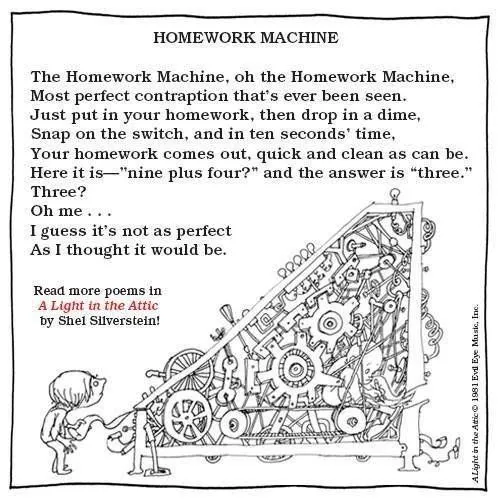
My ode to Shel Silverstein’s ‘Homework Machine’
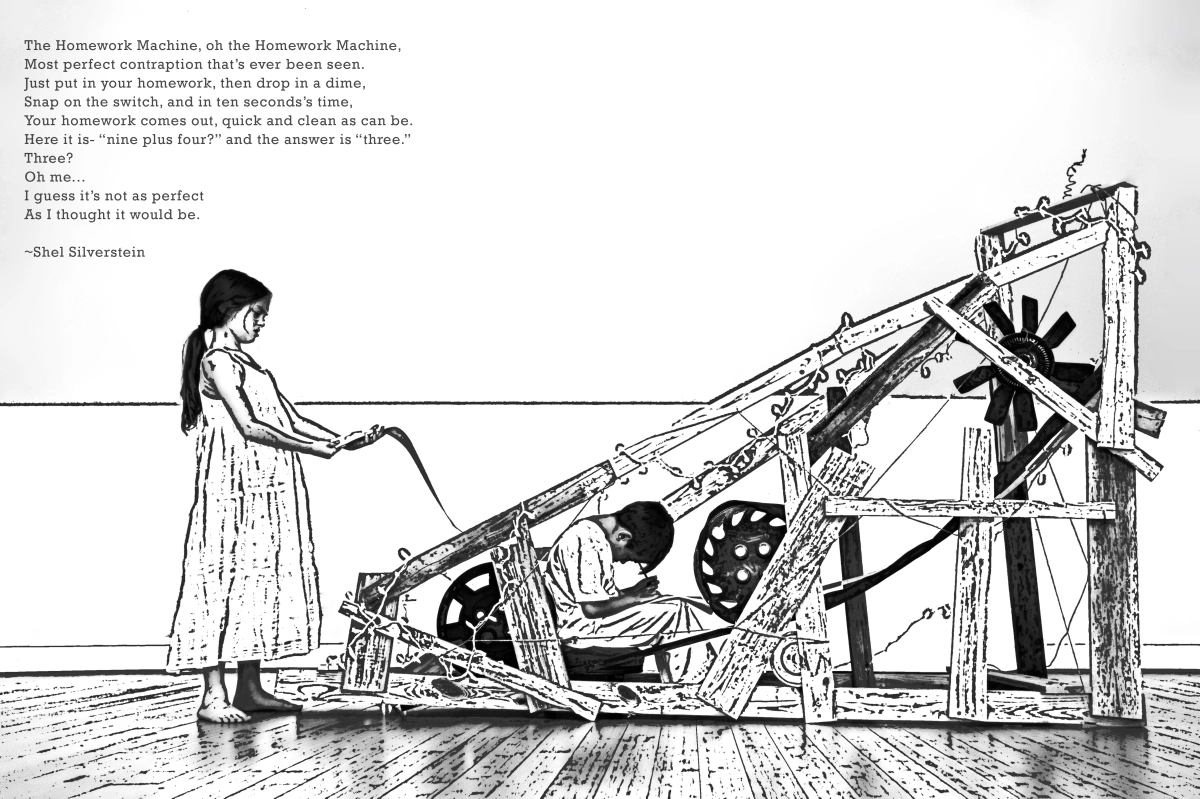
Share this:
- Share on Tumblr

One Comment
Math whizz.
Leave a comment Cancel reply
This site uses Akismet to reduce spam. Learn how your comment data is processed .
- Already have a WordPress.com account? Log in now.
- Subscribe Subscribed
- Copy shortlink
- Report this content
- View post in Reader
- Manage subscriptions
- Collapse this bar
Guided Reading Lesson Plans: Homework Machine by Shell Silverstein (Print & Go)

Also included in
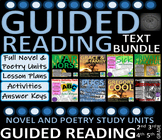
Description
This product has been developed as part of a week long Guided Reading Unit using the poem:
"Homework Machine" by Shel Silverstein (not included in the resource but readily available)
In the poem, the poet describes the incredible invention of a homework machine, describes how it works, how much it costs and how easy it is to use - only to find at the end that it gives the wrong answer to 9 + 4!
We have put together our 5 detailed lesson plans which include notes on how to introduce the poem using a You Tube clip - the link is included in the teaching plans, before reading it yourself. The children therefore hear a professional recital of the poem and understand how fluency, pace and expression should be used.
Included in this product:
- 5 day, detailed lesson plan identifying how to teach the reading of the poem and links with specific resources included and when/how to use them.
- 6 photocopiable resources for the class to use
- Answer Key for each activity where it is needed (one activity is student response to imagery where they share how they respond to specific vocabulary within the poem, therefore no answer key is provided for this activity.
Over the five lessons, the development of the reading of the poem is clear:
Day 1: Hear the poem for the first time, read it aloud together, trying to keep together
Day 2: Continue to practice the poem, adding in expression for the different, contrasting main verses of childhood play and adult responsibility - this also develops language knowledge too.
Day 3: Develop a chorus and split the group into two separate roles
Day 4: Group chorus to be developed further and individual children reading sections and finally, the whole poem with fluency and expression
Day 5: Work through the repertoire which the children now have - group performance, solo and group chorus. Day 5 also includes opportunities for assessment and target setting to reflect on next steps in learning.
Each day, not only do the children learn how to read, recite and perform poetry through a range of activities, but they get to know the poem in greater depth by completing 6 activities:
- Activity 1: Word search identifying new vocabulary - descriptions and names of the 5 characters within the poem
- Activity 2: Rhythm of the poem, counting syllables, looking for patterns
- Activity 3: How the Homework Machine works - writing step-by-step instructions based on the information given within the lines of the poem
- Activity 4: Plotting the poem - how the information about the machine is given to the reader and how we become disappointed in the fact it does not work
- Activity 5: Rhyme Scheme, Poetry observation - questions about the poem
- Activity 6: Comprehension questions and review of learning and discussions through the five lessons
Each activity has its' own answer key, and can form part of the lesson, as it is dictated in the lesson plan, or can be provided as a home based activity, early morning activity, early finisher, or Literacy Center activity.
This plan will easily cover a weeks worth of Guided Reading sessions, and by the end of the week, the children will have learnt the poem off by heart - so why not celebrate by performing it to an audience? Students will know this poem well by the end of the unit and have delved deeply into the meanings, the contrasts, the use of vocabulary, imagery, structure and also, enjoyed the poem too!
If you are focusing on the work of Shell Silverstein, why not view our other Guided Reading Plans for other poems by him:
"Sick" by Shell Silverstein
Where the Sidewalk Ends by Shell Silverstein
"Smart" by Shell Silverstein
Thank you for visiting our store and viewing our products. If you would like to be kept informed of our new materials, sales or freebies, why not follow us by clicking on the star above and be the first to be notified of our newest ideas, resources and products.
Best wishes
INSPIReducation
Questions & answers.
- We're hiring
- Help & FAQ
- Privacy policy
- Student privacy
- Terms of service
- Tell us what you think
Spotify is currently not available in your country.
Follow us online to find out when we launch., spotify gives you instant access to millions of songs – from old favorites to the latest hits. just hit play to stream anything you like..
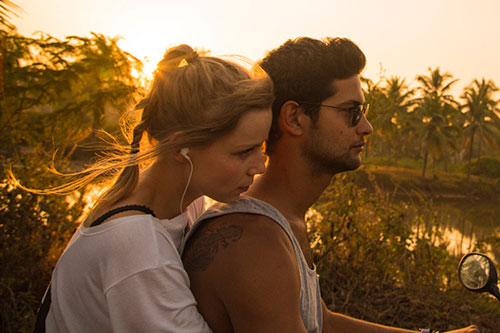
Listen everywhere
Spotify works on your computer, mobile, tablet and TV.

Unlimited, ad-free music
No ads. No interruptions. Just music.
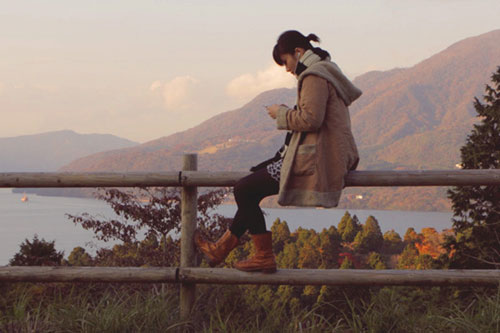
Download music & listen offline
Keep playing, even when you don't have a connection.
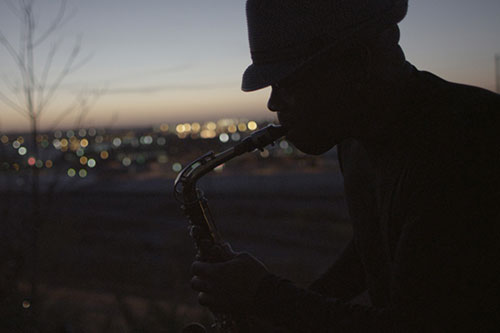
Premium sounds better
Get ready for incredible sound quality.

IMAGES
VIDEO
COMMENTS
The Homework Machine. The Homework Machine, Oh, the Homework Machine, Most perfect. contraption that's ever been seen. Just put in your homework, then drop in a dime, Snap on the switch, and in ten seconds' time, Your homework comes out, quick and clean as can be. Here it is— 'nine plus four?' and the answer is 'three.'.
The Homework Machine. The Homework Machine, Oh, the Homework Machine, Most perfect contraption that's ever been seen. Just put in your homework, then drop in a dime, Snap on the switch, and in ten seconds' time, Your homework comes out, quick and clean as can be. Here it is— 'nine plus four?' and the answer is 'three.'.
The Homework Machine. The Homework Machine, Oh, the Homework Machine, Most perfect contraption that's ever been seen. Just put in your homework, then drop in a dime, Snap on the switch, and in ten seconds' time, Your homework comes out, quick and clean as can be. Here it is—'nine plus four?' and the answer is 'three.'.
The Homework Machine by Shel Silverstein is a humorous and cautionary poem about the dangers of relying on machines to do your work for you. The poem begins with the speaker describing the "Homework Machine" as the "most perfect contraption that's ever been seen." The speaker is excited about the machine because it can do your ...
Analysis (ai): The Homework Machine explores the theme of technological reliance and its potential pitfalls. It humorously portrays a device promising effortless homework completion but ultimately failing to deliver accurate results, leading to frustration. Silverstein's signature wit and rhyme scheme add a playful element to the poem.
Provided to YouTube by Columbia/LegacyHomework Machine · Shel SilversteinThe Best Of Shel Silverstein His Words His Songs His Friends℗ 1985 SONY BMG MUSIC EN...
The Homework Machine. The Homework Machine, Oh, the Homework Machine, Most perfect. contraption that's ever been seen. Just put in your homework, then drop in a dime, Snap on the switch, and in ten seconds' time, Your homework comes out, quick and clean as can be. Here it is— 'nine plus four?' and the answer is 'three.'.
From the Gospel of Shel Silverstein, first performed by the Giving Tree Project and recorded on January 26, 2007, as a fund-raiser for Project Acorn.http://w...
This page features the poem "The Homework Machine" by Shel Silverstein. Enjoy this classic poem about a machine that does your homework for you! +321 123 4567. [email protected]. OnlyArt. Home; Quotes; Articles; Shop. ... Oh, the Homework Machine, Most perfect contraption that's ever been seen. Just put in your homework, then drop in a dime,
By Shel Silverstein. The Homework Machine, Oh, the Homework Machine, Most perfect. contraption that's ever been seen. Just put in your homework, then drop in a dime, Snap on the switch, and in ten seconds' time, Your homework comes out, quick and clean as can be. Here it is— 'nine plus four?' and the answer is 'three.'.
Homework Machine, a poem from 'A Light in the Attic', by Shel Silverstein. If you are not familiar with Mr. Silverstein's works, you most likely were not a child of the 70/80's like myself. You definitely need to know this poet of poets, a wonderful author who was exceptionally gifted at engaging children into his wacky world of meter ...
a reading of The Homework Machine
Read the class the poem "The Homework Machine" by Shel Silverstein. When you are finished, tell the class to draw and color a picture of what they think the homework machine would look like. Then the students are done drawing, have a discussion about the poem and their pictures. For primary grades (especially K or 1), questions like "How big do ...
1980s. An image created with AI that was supposed to show a robot doing homework, but is missing its right arm because these tools aren't every good (Craiyon) Shel Silverstein's "The Homework Machine" tells the story of a child with what would have been an incredible mechanical contrivance when the poem was first published in the early ...
It's ALL HOMEwork right about now, and we bet YOU wish you had a "Homework Machine!" In celebration of #NationalPoetryMonth, here are some friendly and famil...
The Homework Machine, oh the Homework Machine, Most perfect contraption that's ever been seen. Just put in your homework, then drop in a dime, Snap on the switch, and in ten seconds' time, ... by Shel Silverstein! 1 gal . THE VOICE There is a voice inside of you That whispers all day long, "l feel that this is right for me,
"Homework Machine" by Shel Silverstein (not included in the resource but readily available) In the poem, the poet describes the incredible invention of a homework machine, describes how it works, how much it costs and how easy it is to use - only to find at the end that it gives the wrong answer to 9 + 4!
Transcript goo.gl/nr1qNFhttps://drive.google.com/file/d/0B5QgMDk6npsRZVpZbXJQYmxIalU/viewhttps://docs.google.com/document/d/1QR8eAyKtAQWeOJDRkcbJVyYqiyUCFHp...
Listen to Homework Machine from Shel Silverstein's A Light In The Attic for free, and see the artwork, lyrics and similar artists. ... Sheldon Alan "Shel" Silverstein (25th September 1930 - 10th May 1999) was an American poet, songwriter, musician, composer, cartoonist, screenwriter, and author of children's books. ...
How wonderful it would be to have a Homework Machine!
Shel Silverstein · Song · 2005. Listen to Homework Machine on Spotify. Shel Silverstein · Song · 2005. Home; Search; Your Library. Create your first playlist It's easy, we'll help you. Create playlist. Let's find some podcasts to follow We'll keep you updated on new episodes.
About Press Copyright Contact us Creators Advertise Developers Terms Privacy Policy & Safety How YouTube works Test new features NFL Sunday Ticket Press Copyright ...